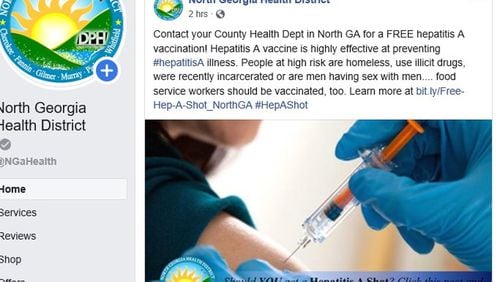Hepatitis A, a potentially fatal liver infection, is ravaging states around Georgia. Last year, it crossed the border here, then exploded.
And public health workers beat it down.
The victory is only partial as cases continue to arise. And it could easily be temporary. But an outbreak that has caused hundreds of deaths nationwide, that is still going strong in Tennessee and was declared a public health emergency two months ago in Florida, is markedly decreasing in this state.
By figuring out what groups were most at risk and aggressively seeking them out to suggest vaccination — in jails, homeless shelters and on the dating website Grindr, the health workers are thus far achieving a decline that reduces the risk that other Georgians will be exposed to the disease.
“It sounds like Georgia took a hard line position and it saved lives,” said Neil Campbell, director of the Georgia Council on Substance Abuse. “I’d say good on you.”
Substance abusers are a major group at risk of Hepatitis A, probably because of lack of good hygiene. The disease is often acquired when a person somehow ingests fecal matter.
Starting in 2016, Hepatitis A outbreaks spread through 30 states, worst of all in the eastern U.S. Only two states, Utah and California, have ended their outbreaks. U.S. Hospitals have admitted 16,000 victims, and more than 270 have died of it.
Kentucky has it worst, followed by states on its north and Tennessee and Florida. Those are two states sandwiching Georgia.
Health worker Alicia Uson, sitting right near the Tennessee border, knew it was only a matter of time.
Working in Dalton in her office at the Georgia Department of Public Health, she is logged into a computer system that notifies the department whenever a lab company gets a positive test result for certain dangerous diseases. The state started seeing cases in June and she knew her district, in north Georgia near Tennessee, was in danger.
“Keep in mind, in a normal year we may see two cases,” Uson said. “October rolled around and we started seeing two cases a month.”
That is the kind of numerical change that may not mean much to ordinary people but was a red flag for the state and workers like her. As the cases started appearing, Uson tried to track down and interview the patients. (Patients’ results are confidential under federal law, but public health workers can access information for the purpose of tracking outbreaks.)
Public health workers know what causes Hepatitis A and they know the broad categories of groups at high risk. Those are drug users, men who have sex with men, homeless people, and people in countries with poor sanitation and general access to health care. In her area, Uson went through her check list of questions with the patients. What she heard most often were indicators of drug use. That’s different from Fulton County, for example, where health workers say gay men appeared more frequently among the patients.
Zachary Taylor, DPH’s director of the region, oversees Uson and her colleagues and reported to the department’s board on their strategy. They got the state to provide large amounts of free Hepatitis A vaccine in that district, removing a $21.90 cost that is a barrier to the uninsured poor and was “a godsend,” Taylor said. And they went to work.
They used social media, posting vaccination information on Facebook. When the gay dating website Grindr offered to post public service ads on vaccination, Georgia agreed.
Then there were the boots on the ground.
Ashley Deverell, immunization coordinator in the Dalton-based district, with her colleagues identified likely hot spots and took nurses there. Starting in December, she visited all six county jails in her district, over and over, talking to inmates about the danger and asking if they'd agree to be vaccinated. She went to homeless shelters, workplaces of food servers, and rehab centers.
Most people were receptive. Some inmates thanked her for coming. One drug addict refused. “The girl, she’s there for drug use,” Deverell recalled. “She said she’s not putting that” — a vaccine — “in her body.” Deverell pulled out the vaccine package and showed her the ingredients.
After a second visit and talk, the girl agreed to be vaccinated.
All in all, that district alone administered about 6,000 vaccinations over the course of the outbreak, about 1,800 of them given by nurses or workers who had loaded up their own cars with the supplies and traveled to target locations.
Statewide, the outbreak has infected more than 680 people and killed 7 Georgians. But the data for September shows that month’s cases at less than half of the peak month’s this spring. That’s true for both the northern Georgia district and the other district disproportionately hit, in the Augusta area.
It’s standard public health work, some officials said, putting aside judgment or stigma to simply attack the disease. It’s a lesson many public health officials failed to heed during the early stages of the AIDS epidemic decades ago.
Dr. James Curran, dean of the Rollins School of Public Health at Emory University and chair of the board that sets policy for DPH, pointed out the money the investment likely saved state health care.
“It’s also very very expensive to care for people in the hospital,” he said. “Every dollar you spend and every day you work really pays a lot of dividends.”
HEPATITIS A
Hepatitis A is a liver infection that can be fatal. Vaccination can prevent it.
What to do:
- In these north Georgia counties, public health clinics are giving free Hepatitis A vaccinations: Cherokee, Fannin, Gilmer, Murray, Pickens, Whitfield
- Anyone who suspects a case of Hepatitis A can report it to 1-866-PUB-HLTH (1-866-782-4584)
People at special risk of Hepatitis A:
- People who use or inject drugs
- People who have unstable housing or are homeless
- People who are or recently were in jail or prison
- Men who have sex with men
- People who already have another liver disease
Symptoms to look out for
- Yellow skin or eyes
- Feeling tired
- Loss of appetite
- Stomach pain
- Joint pain
- Dark urine or light-colored stools
- Fever
- Throwing up or upset stomach
- Diarrhea
Source: U.S Centers for Disease Control and Prevention
About the Author







